Posted: October 31st, 2011 | No Comments »
By way of self-promotion here’s a quick link to me talking about Midnight in Peking on RTHK’s Morning Brew show with Phil Whelan.
As this is technically a history blog I thought I’d better find a suitable picture to accompany this piece of blatant self-aggrandizement. If memory serves I believe that in 1950 many RTHK programmes were recorded or broadcast from the wonderfully named Electra House, Cable & Wireless’s regional headquarters on Connaught Road Central. Sadly gone, the Ritz-Carlton Hotel now occupies the site; a somewhat less impressive building in my humble opinion.
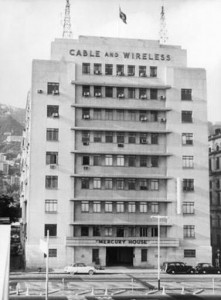
Posted: October 29th, 2011 | No Comments »
 Ewo Pilsner – a standard and widely available beer in Shanghai before 1949 and produced by Jardine’s (EWO was also Jardine’s Hong name). Not sure what it was like, obviously a lager but they didn’t advertise strength or alcoholic content in those days (nor those stupid injunctions to not drink and drive or operate heavy machinery).
Ewo Pilsner – a standard and widely available beer in Shanghai before 1949 and produced by Jardine’s (EWO was also Jardine’s Hong name). Not sure what it was like, obviously a lager but they didn’t advertise strength or alcoholic content in those days (nor those stupid injunctions to not drink and drive or operate heavy machinery).
Here’s Luck!! – not one of the better slogans
Nice to see girls getting a pint down them though!
Posted: October 27th, 2011 | No Comments »
A wee bit of self-promotion (apologies, but you know…) and here’s a nice review of Midnight in Peking that popped up in City Weekend magazine.
By way of compensation I’ll throw in, for free, a nice picture of Peking’s Houguo Hutong as it looks today – in 1937, this hutong was one of the main crossroads of the Badlands and home to bars, brothels and cheap cabarets…take a stroll at night and you’ll get some of that atmosphere.
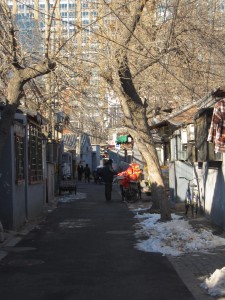
Posted: October 26th, 2011 | No Comments »
A new book of photographs to tie in with the centenary of Xinhai edited by HS Liu – China in Revolution. The publisher sent out the blurb without any samples of the photos in the book, which is never a very good idea!! So can’t comment on the contents except to say that HS usually puts together great books and I was fortunate enough last year to be asked to contribute a foreword to his (and Karen Smith’s) book of photographs on Shanghai: A History in Photographs, 1842-Today. China in Revolution is also blurbed by Peter Hessler who I’m sure is very good but as far as I know has no great or intimate knowledge of 1911 or photography, so take that with a pinch of salt. Surely some blurbers with more direct knowledge of the historical period and media form would have been better? Still, there are several essays in the book by scholars of the period. Details below as ever.
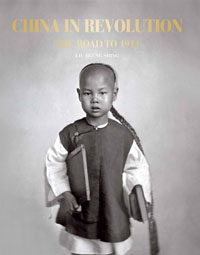
The 1911 Revolution ended dynastic rule in China and paved the way for the founding of Asia’s first republic. Triggered by an accidental bomb explosion in Wuchang (modern-day Wuhan), the revolution marked the culminating point of decades of internal rebellion, foreign aggression and political decline; its leaders drew on a ferment of reformist and revolutionary ideas produced by some of China’s greatest modern thinkers. Although 1911 did not resolve China’s problems, it changed the country for ever, clearing a path for modernisation, and making possible the more decisive revolution of 1949.
China in Revolution assembles a remarkable survey of historical photographs from leading collections around the world. The images stretch from the Second Opium War to the Boxer Rebellion and wars with Russia and Japan, the outbreak of revolution, through the rise and fall of Yuan Shikai and the ensuing warlord era.
Accompanying an introductory essay by the editor Liu Heung Shing are essays from three scholars of revolutionary China — Joseph Esherick of UC San Diego, Zhang Haipeng of the Chinese Academy of Social Sciences, and Max K.W. Huang of the Academia Sinica — reflecting on the causes, achievements and failures of 1911, and its enduring meaning.
Posted: October 25th, 2011 | No Comments »
Born in 1905, a graduate of St John’s in Shanghai, a former Wall Street banker and then the inventor of pinyin – Zhou Youguang now looks back and realises he was sold a pup by the Communists and the PRC, criticizes them and is censored by them and hidden away. Great job from NPR’s Louisa Lim in seeking him out.
Click here to read and listen
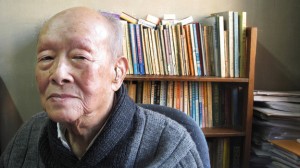
Posted: October 24th, 2011 | 1 Comment »
Leo Ou Fan-lee, probably known best to those who study their Shanghai history as the author of the excellent Shanghai Modern: The Flowering of a New Urban Culture in China, 1930-1945, has a new collection essays, Musings, out exploring cosmopolitanism in postwar Chinese literary culture. Blurb below as usual.

These essays explore cosmopolitanism in postwar Chinese literary culture—from the Hong Kong identity, and intellectuals like Eileen Chang, Gao Xingjian, and Lung Yingtai, to other cultural streams represented by writers ranging from Oe to Kafka.
Leo Lee Ou-fan is currently Sin Wai Kin Professor of Chinese Culture at Chinese University of Hong Kong, having taken early retirement from teaching at Harvard University to become a long-term Hong Kong resident, Apart from his academic work, he has been an active participant in the Hong Kong cultural scene, having published in the past decade nearly 20 books of cultural criticism in both Chinese and English, including (in English) City Between Worlds: My Hong Kong (Harvard University Press, 2008). Among his scholarly books are Shanghai Modern: The Flowering of a New Urban Culture in China, 1930-1945 (Harvard University Press, 1999). In addition to literature, his other humanistic interests include classical music, film, and architecture.
Posted: October 23rd, 2011 | No Comments »
The ups and downs of Beijing’s attempts to deal with the hundredth anniversary of Xinhai and 1911 have rather collapsed. The opera based on the life of Sun Yat Sen (see previous post) that was due to debut in Beijing got cancelled (for “logistical reasons”) while a major conference in Beijing involving scholars from around the world was also kiboshed at the last minute. If you ever needed to see evidence of why 1949 was a major step backwards then just turn up and ask about 1911 in 2011!! What a mess – but not unexpected. I did rather see this coming and anyone who enters into any discussions with Chinese historians won’t be surprised. While many are trying to honestly reassess the final decades of the Qing and the republican period the heavy hand of the CPC restricts and serious work getting done. When you’ve built so much of your education system and national myth on falsehoods about the republic it’s not easy to just let people go find out for themselves!!
Anyway – two pieces worth reading I think on this. David Pilling in the FT has a basic rehashing of the debate while Jonathan Fenby has a more thoughtful and in-depth piece in History Today that comes with slightly unnecessarily gruesome pictures (would it be churlish to say that editors shy away from equally gruesome pictures of communist atrocities when discussing 1949 – it does seem to to me). And finally, Lung Ying-tai author of Big River, Big Sea about families split in 1949 (and predictably banned on the mainland!) talks with the WSJ about 1911 and attempts by scholars to reassess the period in the face of communist intransigence.
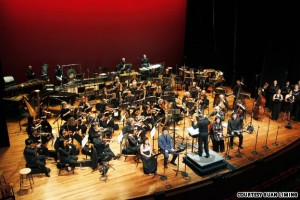
Apparently these musicians peforming the Sun Yat Sen opera were just too much of a threat to Beijing!!
Posted: October 23rd, 2011 | No Comments »
Anyone who’s read Paul Van Dyke’s The Canton Trade: Life and Enterprise on the China Coast, 1700–1845 (2005) will know how fascinating that study of the Canton system was. Now Van Dyke has a new book, Merchants of Canton and Macao: Politics and Strategies in 18th Century Chinese Trade that’s hopefully a great follow up. Details below as ever.
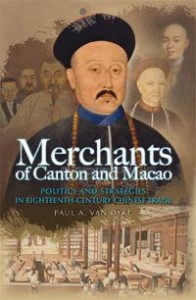
This landmark study of Canton and Macao merchants advances our understanding of the rise and development of international commercial networks. The eighteenth century was a transitional period in world trade when large monopolistic companies gradually lost ground to more efficiently operated private enterprises. The China trade was one of the catalysts propelling this transformation and it is crucial to a better understanding of how and why these changes took place. This study presents much new information about the Canton and Macao merchants and provides fresh insights into the role China played in the rise of global economies.
Paul A. Van Dyke is an historian and author of The Canton Trade: Life and Enterprise on the China Coast, 1700–1845 (2005). He has spent many years researching various aspects of life, trade, and societies in the Pearl River Delta and Maritime Asia.
“Paul A. Van Dyke’s Merchants of Canton and Macao is an invaluable addition to our knowledge of Sino-Western trade in the eighteenth century. The level of detail is outstanding, amassed from a rich source base in multiple languages. And from that data base Van Dyke brings the financial actors in this complex commercial story vividly to life.” — Jonathan Spence, author of The Search for Modern China
“Asia’s ‘dark’ eighteenth-century has never seemed more lively or dynamic. This book will be treasured by all those struggling to understand the hitherto opaque world of pre-modern Chinese business.” — Anthony Reid, author of Southeast Asia in the Age of Commerce
“Only the most dedicated researcher and extraordinary polyglot could aspire to what Van Dyke accomplishes in Merchants of Canton and Macao. Van Dyke’s painstaking research shows that a 200-year-old narrative of Chinese opposition to trade is at odds with the historical record, while also providing unprecedented detail on the actual conduct of the Canton trade and the careers of its leading Chinese merchants. Van Dyke reveals them as canny businessmen, effective lobbyists, family patriarchs, and men embedded in complex global social and economic networks.” — Michael Szonyi, Harvard University
“Paul Van Dyke’s knowledge of eighteenth-century Canton and Macau is so detailed that you feel you are on the ground with the men who made this region of southern China one of the most important modern global trading centres. Based on research throughout the world, Van Dyke presents both a narrative of the daily operations of the China trade and a remarkable archive of the contracts, records books, public notices, maps, receipts, letters and other documents that bring this trade to life.” — Madeleine Zelin, Columbia University
“A remarkable reconstruction of eighteenth-century Canton and Macao merchant practices based upon diverse and scattered archival materials—Van Dyke successfully undermines conventional notions of Chinese ‘monopoly’ control through showing the concrete activities of numerous merchants and government policies responsible for aiding the expansion of trade in this era. This work is an important corrective to European-centred accounts of China’s eighteenth-century foreign trade, to be read with profit by China, Asia, and world historians.” — R. Bin Wong, UCLA
“Based on a multitude of archival sources in various languages other than English, it mainly looks at Chinese entrepreneurs, their business strategies, their biographies and networks—telling us, very convincingly, how these merchants came to act as major players in an increasingly complex world. The story abounds in new details, its views are carefully balanced, and it makes excellent reading. A must for scholars interested in the history of Euro-Chinese relations.” — Roderich Ptak, Ludwig-Maximilians-Universitaet Munich







